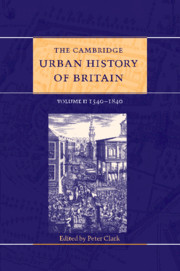Book contents
- Frontmatter
- 1 Introduction
- Part I Area surveys 1540–1840
- Part II Urban themes and types 1540–1700
- 5 Towns in an agrarian economy 1540–1700
- 6 Population and disease, estrangement and belonging 1540–1700
- 7 Politics and government 1540–1700
- 8 Reformation and culture 1540–1700
- 9 The urban landscape 1540–1700
- 10 London 1540–1700
- 11 Great and good towns 1540–1700
- 12 Ports 1540–1700
- 13 Small market towns 1540–1700
- Part III Urban themes and types 1700–1840
- Select Bibliography
- Index
- References
11 - Great and good towns 1540–1700
from Part II - Urban themes and types 1540–1700
Published online by Cambridge University Press: 28 March 2008
- Frontmatter
- 1 Introduction
- Part I Area surveys 1540–1840
- Part II Urban themes and types 1540–1700
- 5 Towns in an agrarian economy 1540–1700
- 6 Population and disease, estrangement and belonging 1540–1700
- 7 Politics and government 1540–1700
- 8 Reformation and culture 1540–1700
- 9 The urban landscape 1540–1700
- 10 London 1540–1700
- 11 Great and good towns 1540–1700
- 12 Ports 1540–1700
- 13 Small market towns 1540–1700
- Part III Urban themes and types 1700–1840
- Select Bibliography
- Index
- References
Summary
provoked by the French charge that there was ‘never a good town in England, only London’, the English herald in the Debate of the Heralds of 1549 was moved to respond at length: ‘I pray you, what is Berwick, Carlisle, Durham, York, Newcastle, Hull, Northampton, Norwich, Ipswich, Colchester, Coventry, Lichfield, Exeter, Bristol, Salisbury, Southampton, Worcester, Shrewsbury, Canterbury, Chichester?’ All these, and more, ‘if they were in France, should be called good towns’.
The herald’s list of twenty towns embraces between a third and a half of the fifty or so regional centres and major county towns of England which – with their equivalents in Scotland and Wales – are the subject of this chapter. It also contains fourteen – almost one half – of the thirty-one largest English provincialm towns in the early sixteenth century, which are enumerated in Table 11.1 below. It is evident from the other six towns nominated by the herald, however, that size of population was not the only criterion for entry in his list. Lichfield, Chichester, Durham and Carlisle were there because, like others, they were cathedral cities, Hull because it was another important port, Berwick as a vital frontier citadel. Without some of these, moreover, the thinly populated North of England would scarcely have been represented at all. Status and function were as important as size in defining good towns.
- Type
- Chapter
- Information
- The Cambridge Urban History of Britain , pp. 347 - 376Publisher: Cambridge University PressPrint publication year: 2000
References
- 9
- Cited by

